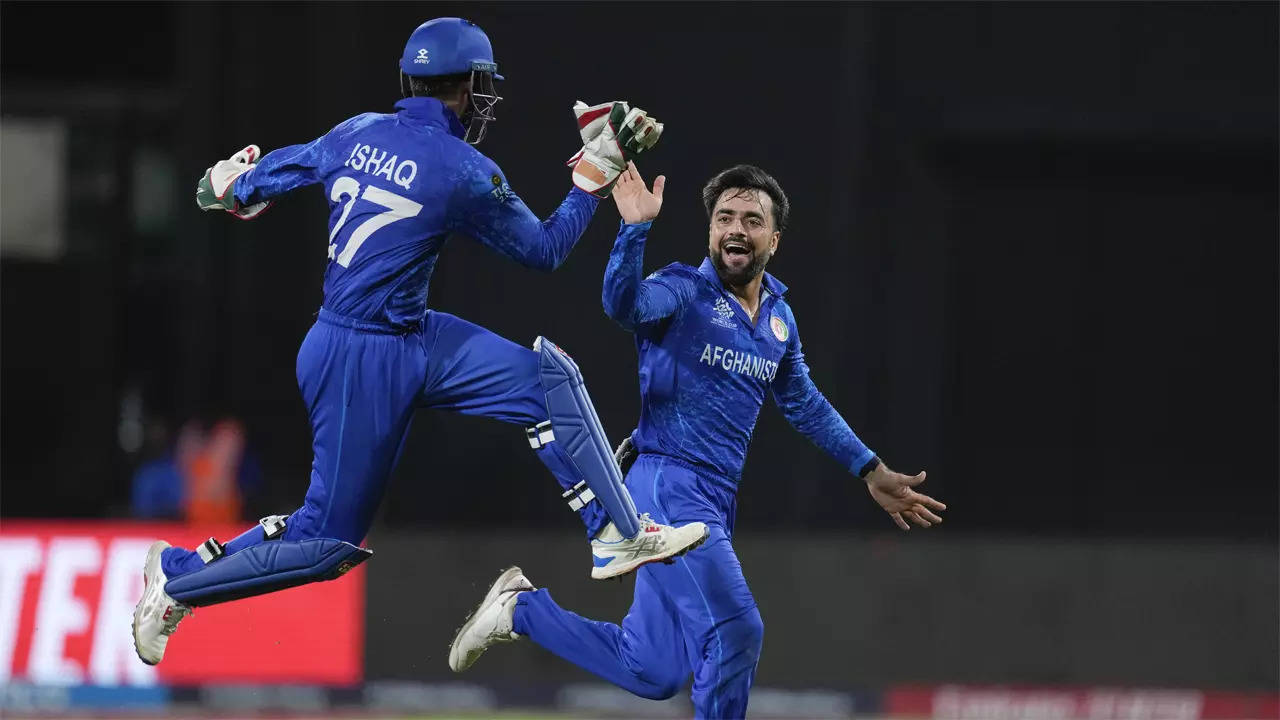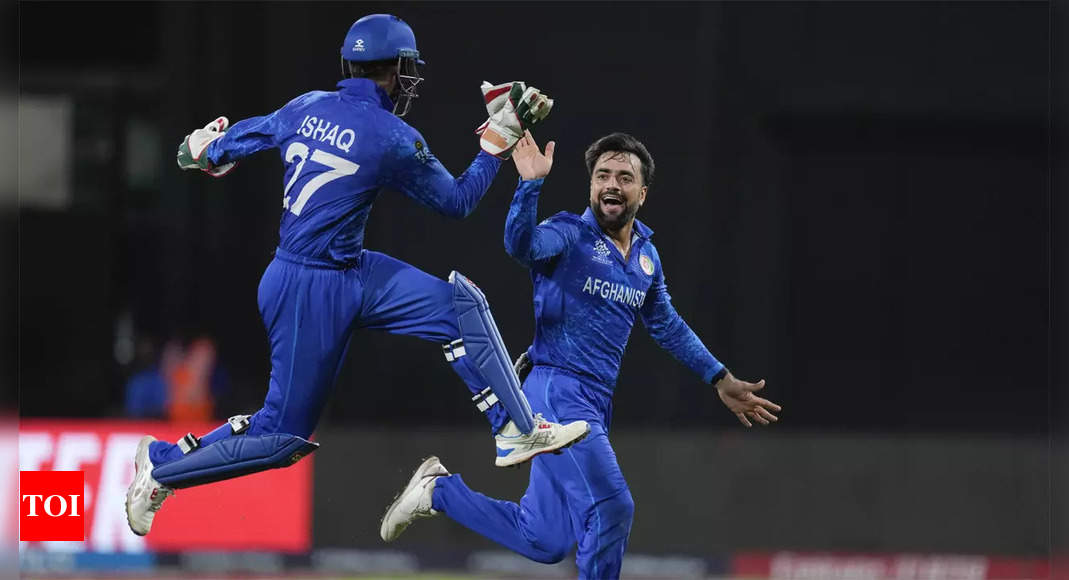
Afghanistan, the tournament’s surprise package, will face off against South Africa, the perennial dark horses, in the first semifinal of the T20 World Cup at the Brian Lara Stadium in Trinidad.
Afghanistan’s journey to the semifinals has been nothing short of remarkable, as they have risen above the challenges posed by the ongoing conflict in their homeland.Their stunning victory over the defending champions, Australia, whom they had never defeated before, exemplifies their resilience and determination.
The Afghan team has been propelled by the contributions of several key players. Captain Rashid Khan has been outstanding throughout the tournament, while pacers Fazalhaq Farooqi and Naveen-ul-Haq, along with batsman Rahamanullah Gurbaz have consistently provided early breakthroughs.
Gurbaz leads the batting chart with 281 runs, and Farooqi sits atop the bowling list with 16 wickets, surpassing some of the tournament’s marquee names.
Gulbadin Naib’s miraculous spell against the Australians and Mohammad Nabi’s perseverance have also been crucial to their success.
The Afghans are no strangers to intense competition, having risen from the lower tiers of international cricket in the early 2000s. The T20 format, more than any other, provides them with the opportunity to challenge the established cricketing powers. However, the semifinal of a World Cup is uncharted territory for the Afghan team, and they will need to manage their nerves to overcome their formidable opponents.
Afghanistan coach Jonathan Trott is not overawed by the big occasion of the semifinal.
“We go into the semifinal with no scarring or no history. This is uncharted territory for us. But by no means do we feel like we’re going into the semifinal just to compete. We’re there to win the semifinal. We’ve beaten some major teams,” Trott said after the win over Bangladesh.
South Africa’s wounds are also profound, but they are entirely related to cricket.
Since their return to international cricket in 1991, the Proteas have put together some high-powered teams but have never succeeded in reaching the final round of a T20 or 50-over World Cup.
To alter that enduring narrative of misfortune, South Africa must not only subdue Afghanistan but also conquer the inner demons that haunt their own psyche. The indications thus far have provided cause for optimism.
In this tournament, they have demonstrated an ability to emerge victorious in pivotal moments, a vulnerability that has often emerged unexpectedly in previous global competitions.
However, in this event, they have secured triumphs by margins as narrow as one run (vs Nepal), four runs (vs Bangladesh), and three wickets (vs West Indies).
The South Africa of the past might have faltered in such circumstances, but Aiden Markram’s team has exhibited remarkable resilience. They appear to have eluded the overused C-word ‘chokers’.
Keshav Maharaj, an experienced left-arm spinner, elaborated on his team’s performance in this World Cup.
“If you look at previous World Cups, the small moments, we haven’t really won. It’s good to see that all the games have come really close and we’ve found a way, so it’s building the character within the team,” said Maharaj.
“It prepares us for certain opportunities that we could get and cross over the line in those small moments. These are things that we’ve never done before. So it’s good to see us getting into that.”
Temba Bavuma’s statement encapsulates the united endeavor displayed by the South African team throughout the tournament.
Despite having only Quinton de Kock in the top-10 batters’ list, positioned at sixth with 199 runs from seven matches, and no bowlers within the top 10, South Africa have managed to secure a spot in the semifinal. They now need to navigate the crucial moments against Afghanistan to enter the final.
This time, the thought of facing such challenges might not be as daunting for the South African team.
If Afghanistan can also maintain their composure during the high-pressure situations, the stage is set for an epic encounter that could be remembered for years to come.
Afghanistan’s journey to the semifinals has been nothing short of remarkable, as they have risen above the challenges posed by the ongoing conflict in their homeland.Their stunning victory over the defending champions, Australia, whom they had never defeated before, exemplifies their resilience and determination.
T20 WORLD CUP: Schedule | Points Table
The Afghan team has been propelled by the contributions of several key players. Captain Rashid Khan has been outstanding throughout the tournament, while pacers Fazalhaq Farooqi and Naveen-ul-Haq, along with batsman Rahamanullah Gurbaz have consistently provided early breakthroughs.
Gurbaz leads the batting chart with 281 runs, and Farooqi sits atop the bowling list with 16 wickets, surpassing some of the tournament’s marquee names.
Gulbadin Naib’s miraculous spell against the Australians and Mohammad Nabi’s perseverance have also been crucial to their success.
The Afghans are no strangers to intense competition, having risen from the lower tiers of international cricket in the early 2000s. The T20 format, more than any other, provides them with the opportunity to challenge the established cricketing powers. However, the semifinal of a World Cup is uncharted territory for the Afghan team, and they will need to manage their nerves to overcome their formidable opponents.
Afghanistan coach Jonathan Trott is not overawed by the big occasion of the semifinal.
“We go into the semifinal with no scarring or no history. This is uncharted territory for us. But by no means do we feel like we’re going into the semifinal just to compete. We’re there to win the semifinal. We’ve beaten some major teams,” Trott said after the win over Bangladesh.
South Africa’s wounds are also profound, but they are entirely related to cricket.
Since their return to international cricket in 1991, the Proteas have put together some high-powered teams but have never succeeded in reaching the final round of a T20 or 50-over World Cup.
To alter that enduring narrative of misfortune, South Africa must not only subdue Afghanistan but also conquer the inner demons that haunt their own psyche. The indications thus far have provided cause for optimism.
In this tournament, they have demonstrated an ability to emerge victorious in pivotal moments, a vulnerability that has often emerged unexpectedly in previous global competitions.
However, in this event, they have secured triumphs by margins as narrow as one run (vs Nepal), four runs (vs Bangladesh), and three wickets (vs West Indies).
The South Africa of the past might have faltered in such circumstances, but Aiden Markram’s team has exhibited remarkable resilience. They appear to have eluded the overused C-word ‘chokers’.
Keshav Maharaj, an experienced left-arm spinner, elaborated on his team’s performance in this World Cup.
“If you look at previous World Cups, the small moments, we haven’t really won. It’s good to see that all the games have come really close and we’ve found a way, so it’s building the character within the team,” said Maharaj.
“It prepares us for certain opportunities that we could get and cross over the line in those small moments. These are things that we’ve never done before. So it’s good to see us getting into that.”
Temba Bavuma’s statement encapsulates the united endeavor displayed by the South African team throughout the tournament.
Despite having only Quinton de Kock in the top-10 batters’ list, positioned at sixth with 199 runs from seven matches, and no bowlers within the top 10, South Africa have managed to secure a spot in the semifinal. They now need to navigate the crucial moments against Afghanistan to enter the final.
This time, the thought of facing such challenges might not be as daunting for the South African team.
If Afghanistan can also maintain their composure during the high-pressure situations, the stage is set for an epic encounter that could be remembered for years to come.
Source link

